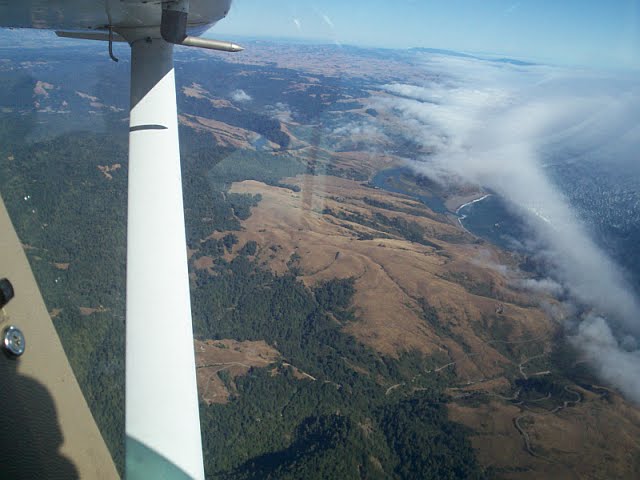When I began my quest for an IFR rating over three years ago I had a simple goal in mind. Living in the San Francisco area of California we are subject to frequent overcast layers in the summer, referred to as the marine layer. My wife and I had to cancel many flights because of this thin cloud layer hanging over the airport. The frustrating part of this phenomena is that the Central Valley, only a few miles away, will typically be CAVU at the same time.
I understood that my aircraft had the bare minimum for instrument flight - steam gauges, dual VORs and a VFR GPS. There is no backup alternator and no autopilot. I also understood that my financial situation and other interests limit just how much flying I can do every month. For these reasons I realized I would probably never be a "hard core" IFR pilot. I just wanted to have the rating to be able to climb through this pesky marine layer, not actually fly for an extended periods of time in clouds.
My disappointment came when, after three years of training and over $8000 spent, I learned that my original plan for my rating was fatally flawed.
My first solo IMC flight flight taught me some very important aspects of IFR flight.
First, there is no such thing as "just being good enough to get through a marine layer". Expecting that a minimal level of IFR proficiency will be adequate fails to recognize the first rule of weather - weather changes.
In addition, pilot reports may be wrong or weather briefings may have little to do with the actual weather conditions you may encounter. Unexpected conditions WILL occur.
The moment you launch on every IFR flight you must be mentally prepared to fly for an extended period of time in IMC. If you are not fully proficient, and mentally prepared for this occurrence, then you are only a few chain links away from an NTSB statistic.
Inside a broiling, bouncing world where the view outside the windscreen offers nothing to the senses gives you an appreciation for system redundancy, capable navigation equipment.and the benefits of a three axis autopilot. Single pilot IFR in, IMC conditions and coupled with a complex airspace, requires skill, mental agility and recency of experience.
My first solo marine layer penetration ended with me stuck in the middle of a very thick layer of building cumulus. ATC began giving me frequent heading an altitude changes that were not part of my flight plan. The turbulence, though light, allowed little time to take my eyes off of the gauges. Within a very few minutes I learned that I was not mentally prepared for this environment. I was at the very limit of my ability to handle the conditions.
Then it struck me - what if I had a system failure of some type right now? What would happen if I lost the electrical system or one of the VORs? What if my attitude indicator went tango uniform? I asked myself, would I be able to manage such a failure?
The harsh realization came to me that I would not. Such a failure, if occurred at that exact time, would probably result in a loss of control of the aircraft in a short period of time.
When I finally managed to get the plane back on the ground and the hangar door closed, an honest truth came to the forefront of my thoughts.
The idea that you can just maintain a minimal level of IFR competency will absolutely get you, and your loved ones, killed.
After further consideration I also realized that flying an aircraft with the bare minimum of IFR equipment is not good enough for me and my precious copilot wife.
I truly wished someone would have said to me at the beginning of my training that "being just good enough to fly through a marine layer" will never be good enough to fly IFR safely. I may not have listened, but I wish an instructor or other pilot had raised the idea. If I knew then what I know now, I would not have spent the time, money and effort to get my IFR ticket.
I don't' mean to say that I did not learn a lot about flying, and my aircraft, in the process. My flying skills, knowledge and decision making have progressed tremendously because of my IFR training. In some ways I feel I flew for twenty years without really understanding what I was doing. My IFR training truly opened my eyes and made me feel, at long last that, yes, I am a real pilot.
